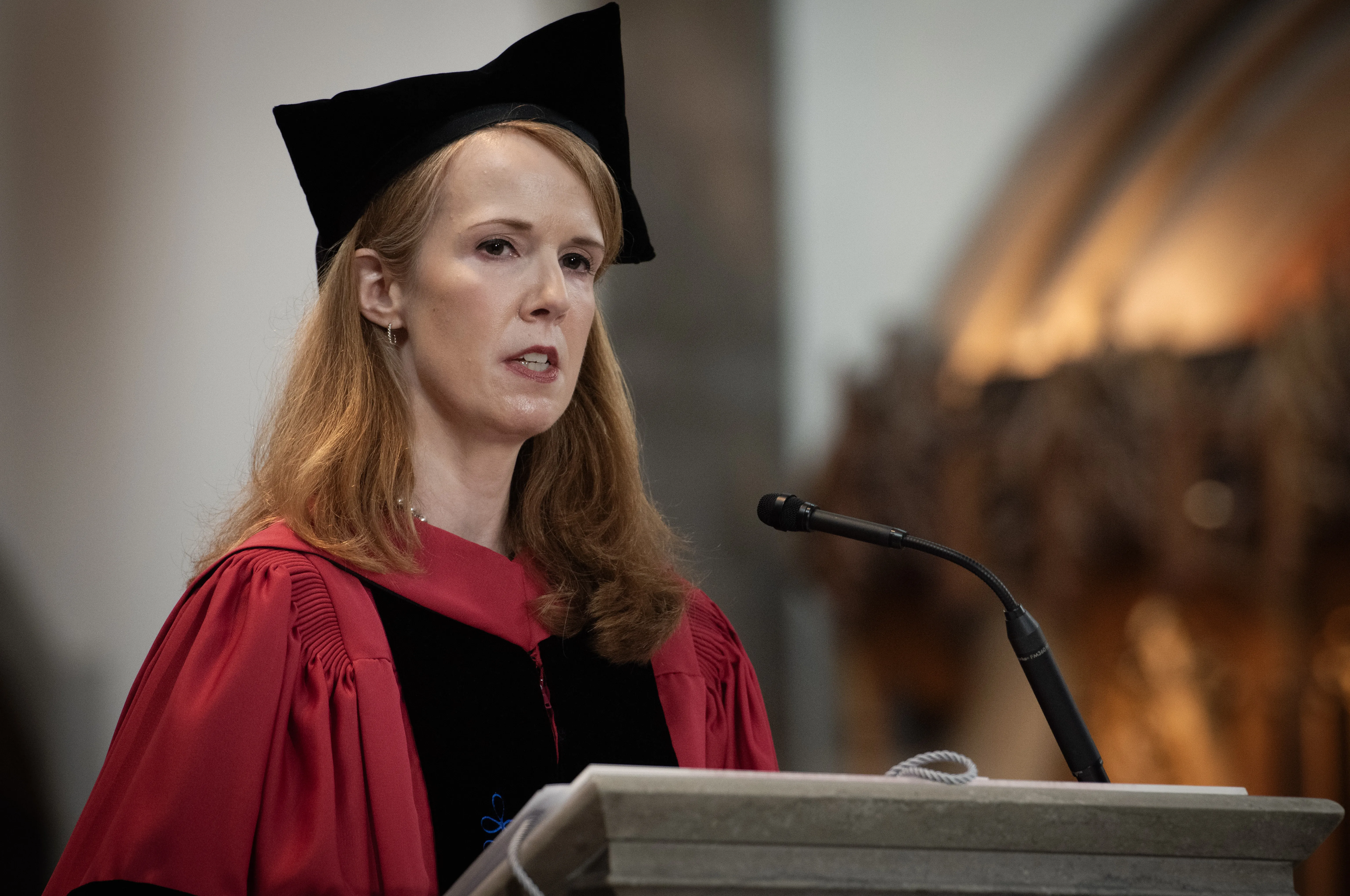‘The Classes of 1861 and 2025’

Thank you very much, Dean Miles, for that introduction.
Class of 2025, families, and friends, it is a tremendous honor for me and for all of the faculty of the University of Chicago Law School to join you here on this momentous day.
Before I proceed to my remarks, I’d like to take a moment to recognize Dean Tom Miles, who is completing ten years of service as dean of the Law School, and for whom today’s hooding ceremony is the final one in the decanal chair. Dean Miles, on behalf of your faculty colleagues, we look forward to welcoming you back to the pews. Please join me in thanking Dean Miles for his exceptional work on behalf of the Law School.
Let me begin with a story. This story is historical in nature.
On April 15, 1861, three days after the American Civil War had begun with South Carolina’s bombardment of federal Fort Sumter, President Abraham Lincoln issued a proclamation calling for 75,000 volunteer troops to suppress the rebellion. “The response of the loyal states to the call of Lincoln was perhaps the most remarkable uprising of a great people in the history of mankind,” observed U.S. Senator John Sherman of Ohio. But, Sherman added, “the men who answered the call were not soldiers, but citizens.” Indeed, as Sherman noted, the volunteers were shopkeepers, farmers, factory workers, and teachers. They were not professional soldiers.
On that same April 15, twenty-seven young men sent a one-page petition to the Secretary of War in Washington, D.C. The young men – nearly all in their early twenties – were cadets at the United States Military Academy at West Point, New York. They were members of what was known as the “first class” (that is, the most senior class) of cadets. They were due to graduate two months later, in July. But they asked the Secretary of War – and, through him, President Lincoln – to accelerate their departure. “We, the undersigned members of the graduating class at the Military Academy do respectfully request to be allowed to graduate now” – the “now” was underlined – “and take our places among those who are serving this country and vindicating its flag,” they wrote. Their petition is now in the collection of the National Archives.
And so three days into the war, as Fort Sumter still smoldered in Charleston Harbor, the Secretary of War and the President granted the cadets’ petition to hurry their graduation. The reason was straightforward: the government of the United States urgently needed professional officers – even 21-year-old ones – to train those thousands of farmers and shopkeepers who had volunteered to defend the Union.
In early May of 1861, the forty-five members of the first class – minus two who had left early to, as the official records put it, “join in the rebellion against the United States” – departed by steamboat from West Point for Washington, D.C. Along the way, they equipped themselves with swords, pistols, and uniforms. When they reached Washington, they began the work of drilling the raw volunteers. The West Point cadets were now lieutenants in the United States Army.
But President Lincoln required still more lieutenants. A mere six weeks later, in June of 1861, as battles ignited in Virginia and in the West, the next class of cadets – who still had another year left at the Academy – were graduated and sent off to Washington. This cohort of thirty-six new lieutenants had the good fortune to meet the President himself as they were receiving their commissions. “A fine crop, a fine crop, Mr. Secretary!,” Lincoln remarked as he shook their hands in the War Department Annex.
This “fine crop” of young officers included the sons of East Coast aristocrats, midwestern blacksmiths, and hardscrabble farmers. Among them were a Du Pont, of the wealthy family of Delaware industrialists, as well as an immigrant stonecutter from County Cavan, Ireland.
But what did they have in common? As one of the newly commissioned lieutenants put it, “We had had the best the world afforded in the way of training. We had graduated from West Point, and a man from that institution at that time was a very valuable possession to the government.”
One of their predecessors at the Military Academy, a graduate of the class of 1843, expressed a similar sense of duty in that first spring of the war. “[N]ow all party distinctions should be lost sight of and every true patriot be for maintaining the integrity of the glorious old Stars & Stripes, the Constitution, and the Union,” wrote Ulysses S. Grant to his slaveholding father-in-law.
Grant, who had hopes of being appointed a colonel, expanded on these ideas a few weeks later in a letter to his father, “Having been educated for such an emergency, at the expense of the Government, I feel that I have upon me superior claims, such claims as no ordinary motives of self-interest can surmount.” Grant concluded: “[W]e have a Government, and laws and a flag and they must all be sustained. I would never stultify my opinions for the sake of a little security.”
The Constitution and the Union. A Government, and laws, and a flag. That Government’s claims upon individuals who have been educated for an emergency. The possibility that fulfilling those claims – and not stultifying one’s opinions about them – might potentially risk one’s self-interest or security.
So what does this brief excursion into 1861 have to do with us, here, in 2025?
Law schools are funny creatures. A law school is, first and foremost, an academic institution – a center of intellectual inquiry, where professors and students are joined in a mutual enterprise of study of a body of knowledge – “the law” – using a particular set of methods – “legal analysis.” In this respect, a law school is similar to other divisions and departments within a great university such as this one.
But a law school has an additional purpose as well. And that purpose is a public purpose that is central to the existence of the American republic. For a law school trains the people who will hold the power of the state – of the government – in their hands, whether as lawyers, judges, public servants, or legal scholars. A law school exists to educate, to cloak, to put under color of, and to entrust its students not only with knowledge of the law, but with the privilege and duty to uphold and defend the law against the raw claims of power.
In this way, a law school is a repository of the highest values of our republican form of government – democracy, yes, and the Declaration of Independence and the Constitution, which the young Abraham Lincoln – more than twenty years before the Civil War – referred to as “the laws” that form “the political religion” of the United States.
A law school gets to hold a piece of that political religion of laws in its hands. In return, the law asks those of us who share in its authority to act upon our duty to protect it. All of you graduating today are part of this great enterprise.
Why did President Lincoln have such urgent need of not one but two classes’ worth of West Point graduates in the spring of 1861? He needed them because he needed lieutenants – not generals (he had plenty of those, albeit of varying quality), and not privates (who were enlisting in the thousands). In a moment of world-overturning crisis, the nation required educated young people who had “had the best the world afforded in the way of training.”
Members of the University of Chicago Law School Class of 2025, it is your great honor to graduate now – underlined – and to take your places among those who are serving this country and vindicating its Constitution.
Thank you and congratulations!
